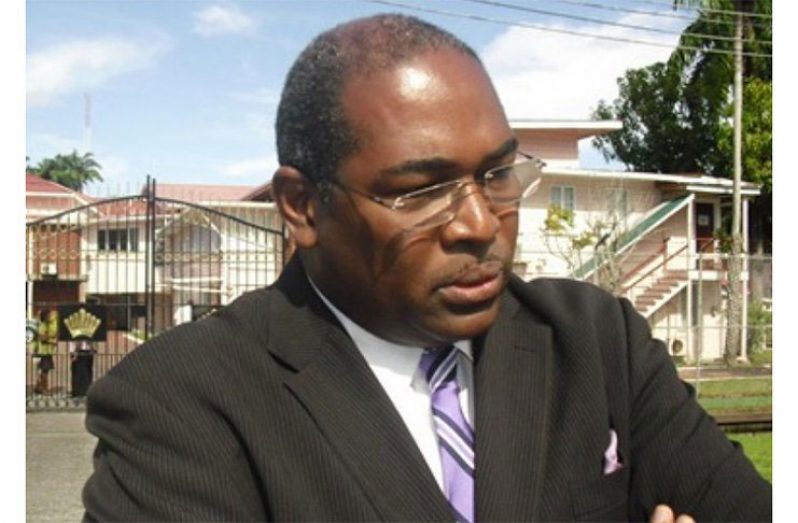…Nigel Hughes says ill-informed political discourse adding tension to society
…making racial climate more difficult, challenging
ATTORNEY-AT-LAW Nigel Hughes says that while some in the political realm are suggesting that a constitutional crisis will ensue in Guyana come March 21, 2019, the real “crisis” would be for the country to experience contrasting decisions in an electoral and judicial process.
“Assuming, in the middle of this present appeal, there were by some miracle to have an election on March 22 this year and there is a result of that election that is contrary to the result that we have in 2015, and then sometime in April we get a ruling from the Caribbean Court of Justice that say’s the no-confidence vote was invalid…but you’ve got a new president. What is the consequence of that,” Hughes reasoned.
“They are going to say that the new President was validly elected in office and one side is going to say ‘what are you talking about? The President only got elected by virtue of a no-confidence vote on the assumptions that it was valid’. In my view, it is less than careful to put the country – looking at the extreme position – in that crisis…think about the social disruption that will take place. It would be irresponsible to allow the country to get there.”
Hughes was speaking at the time on the ‘Facing the Nation’ programme hosted by Press Secretary and Television Anchor, Malika Ramsey last week. Since the ruling of the High Court on the passing of the December 2018 no-confidence motion, the government has challenged the decision which is up for ruling in the Court of Appeal this week.
Oral arguments for the Conservatory Orders and Stay of proceedings are expected soon. Hughes said that as in any other court case, a party that is not in favour of a particular ruling has the right to appeal the decision until all their options of appeal are exhausted.
While the opposition has criticised the government for challenging the validity of the motion, the President has reminded the public that the Speaker of the National Assembly, in declining to reverse the December 21, 2018 decision, recommended that settlement be sought through the court.
Hughes stated that presently there are several interpretations of the Constitution regarding the passing of the no-confidence motion and it is in the best interest of the country for the conflict to be resolved once and for all by the court. He also addressed the opposition’s cries of a looming “constitutional crisis”, as being promoted as an “acute political rhetoric with the intent of creating an atmosphere of instability”.
“I don’t think we have social instability. I certainly don’t think there’s anything unstable about where we are. Institutions are functioning, there’s no social unrest, it’s not as if there’s a strike; it’s not as if law and order is under threat; it’s not as if there are certain sections of the population that feels that they are being targeted,” he assessed.
“What we do have is a very acute and thrill political conversation taking place between two major political parties that has added to the tension of the society and has, I would say, made the racial climate more difficult and more challenging,” Hughes said.
“I don’t think in that sort of environment that anybody…should add to anything that may acerbate those difficult circumstances. At the end of the day we’ve identified a problem and therefore I think, as people, we must be able to identify a solution and we must pursue it in some sort of a rational way.”
At the recent memorial held by the opposition for the late former President, Dr. Cheddi Jagan, at the Babu Jaan community, Opposition Leader Bharrat Jagdeo had urged supporters to “chase” government members from their communities come March 21, 2019. “When the ministers or Granger or Nagamootoo come here after the 21st of March, say to them, walk behind them and chase them out; they’re gonna be illegal,” he said.
APPEAL TO THE BEST IN US
However, commenting on the current political climate, Hughes said: “Our political leaders cannot continue to appeal to the worst in us. We can’t chase anybody out; we can’t decide we’re putting people there [in power] because they’re loyal to us or they look like us. We have to appeal to the best in us and really say to the country, ‘this is how we begin to build a nation’.”
He later added: “Shouting at each other doesn’t solve it. At some stage you’ve got to come to the table to talk. I hope, in Guyana’s case, the examples throughout the world [will prove] that even in the worst of wars; the worst of social crisis; in the worst of civil uprising; at the end of the day you have to come to the table and talk.”
Indeed, according to Article 106 (7) of the Constitution, an extension of March 21, 2019 deadline can be extended by “not less than two-thirds of the votes of all the elected members of the National Assembly”.
However, it has been noted in the media that should the High Court’s decision be upheld that the no-confidence motion was validly passed and in the absence of the two-thirds majority, the Appellate Court has the power to extend the timeframe.
Leaving his opinion on the current political debate and contrasting it to Guyana recent discovery of oil, Hughes said: “If we only think about the sort of transformational effect that could take place as a result of this bonanza in oil – if used properly, transparently etcetera – then really we should be working together as to how we’re going to create strong democratic institutions that will give everybody equal opportunity…we have this fantastic opportunity and we’re spending it fighting each other.”




.png)









